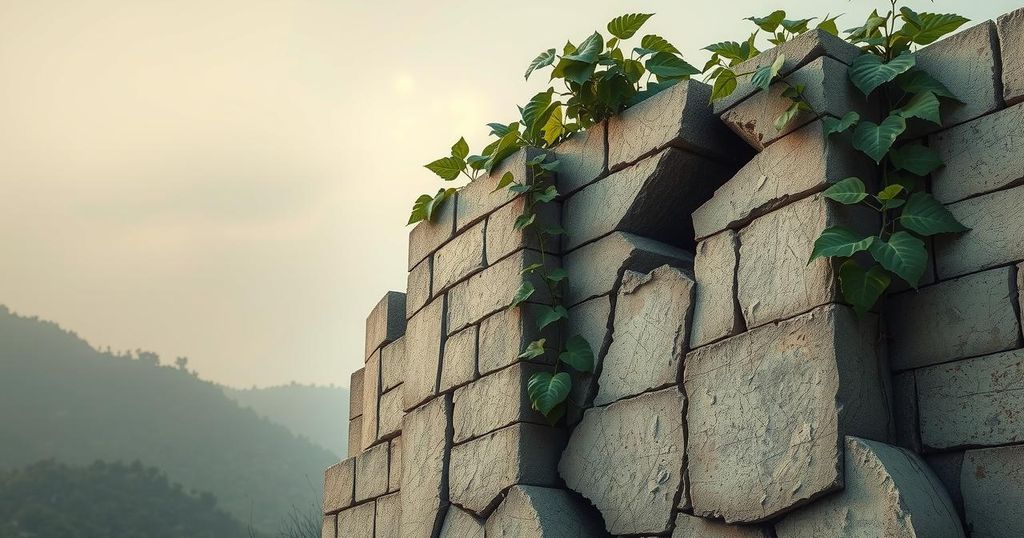Syria’s Leadership Faces Challenges Amidst Tensions with Lebanon

Syria’s new government under President Ahmed Shara’a faces significant challenges due to Hezbollah’s activities in Lebanon destabilizing Syria. Recent clashes highlight tensions as Lebanon’s military increases its presence at the border. Diplomatic communication between the two countries is vital to curb violence and manage smuggling operations effectively.
Syria’s new government, led by President Ahmed Shara’a since late January, is encountering challenges regarding the situation in Lebanon, particularly with Hezbollah’s ongoing activities that are destabilizing portions of Syria. Recent clashes near the Lebanese border highlight these troubles, as Syria attempts to address lawlessness and smuggling in the region.
The developments come just after U.S. Deputy Special Envoy for the Middle East, Morgan Ortagus, visited Lebanon, where a new government has emerged, including a new prime minister and president. The new Lebanese president, a former military commander, indicates a robust stance against Syria, while the Lebanese army remains equipped with American arms, contrasting with Syria’s outdated military resources.
Tensions escalate as reports suggest a Lebanese military buildup near the border. Both Serbian and Lebanese forces have mobilized, leading to increased clashes between military groups on each side. The Syrian government claims to be targeting smuggling operations, yet state media has downplayed its success, acknowledging the difficulty of managing such issues.
The syrian government has recently made efforts to unify fragmented factions and has claimed to have seized weapons intended for Hezbollah over the last two months. Shara’a has engaged in communication with Lebanon’s new president to coordinate security efforts at the border amid ongoing clashes in regions like Qusayr, historically significant for Hezbollah’s involvement in Syria.
The Lebanese army has responded assertively to provocations from Syrian territory, implementing security measures along the border, including establishing observation points and conducting patrols. Lebanese municipalities have called for action against repeated attacks from Syrian forces, reflecting the serious security challenges both countries face amidst ongoing instability.
Additionally, Syria has highlighted its operations against organized crime and smuggling, reporting arrests of individuals involved in illegal activities. The ongoing clashes in northern Bekaa Valley underline the complexity of the situation as tribal fighters assert their positions, complicating relations between Lebanon and the new Syrian leadership. The presence of Hayat Tahrir al-Sham and its conflict with Lebanese forces further exacerbates the security dilemma for Shara’a’s administration.
The Syrian government must remain vigilant concerning the deteriorating situation at the border, as increased tensions pose a significant threat to national security. With international engagement and diplomatic efforts needed, the government under Shara’a must navigate these challenges carefully to avoid escalation of violence along the Lebanese-Syrian border.
The recent clashes between Syria and Lebanon underscore the persistent issues in their relationship, particularly in the context of Hezbollah’s influence in Lebanon and its repercussions in Syria. Following more than a decade of conflict, Lebanon’s new leadership is attempting to assert control, highlighting the ongoing struggle for influence and security in a region fraught with historical tensions and military challenges. The effectiveness of both governments in managing cross-border violence and illicit activities will be crucial in shaping future relations between the two nations.
In conclusion, the evolving situation at the Lebanese-Syrian border presents critical challenges for Syria’s new government, particularly concerning the ongoing influence of Hezbollah and lawlessness along their shared border. Effective coordination between the new leaderships in both countries will be vital in addressing security issues and reducing tensions. As military buildups and clashes continue, both nations must navigate a complex landscape to prevent further instability.
Original Source: www.jpost.com








